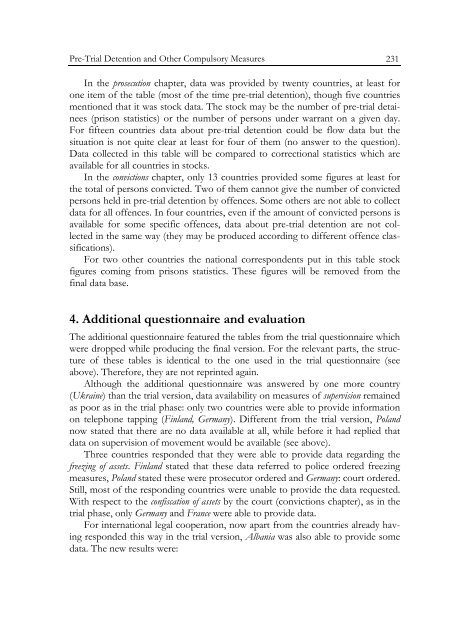Defining and Registering Criminal Offences and Measures - Oapen
Defining and Registering Criminal Offences and Measures - Oapen
Defining and Registering Criminal Offences and Measures - Oapen
You also want an ePaper? Increase the reach of your titles
YUMPU automatically turns print PDFs into web optimized ePapers that Google loves.
Pre-Trial Detention <strong>and</strong> Other Compulsory <strong>Measures</strong> 231<br />
In the prosecution chapter, data was provided by twenty countries, at least for<br />
one item of the table (most of the time pre-trial detention), though five countries<br />
mentioned that it was stock data. The stock may be the number of pre-trial detainees<br />
(prison statistics) or the number of persons under warrant on a given day.<br />
For fifteen countries data about pre-trial detention could be flow data but the<br />
situation is not quite clear at least for four of them (no answer to the question).<br />
Data collected in this table will be compared to correctional statistics which are<br />
available for all countries in stocks.<br />
In the convictions chapter, only 13 countries provided some figures at least for<br />
the total of persons convicted. Two of them cannot give the number of convicted<br />
persons held in pre-trial detention by offences. Some others are not able to collect<br />
data for all offences. In four countries, even if the amount of convicted persons is<br />
available for some specific offences, data about pre-trial detention are not collected<br />
in the same way (they may be produced according to different offence classifications).<br />
For two other countries the national correspondents put in this table stock<br />
figures coming from prisons statistics. These figures will be removed from the<br />
final data base.<br />
4. Additional questionnaire <strong>and</strong> evaluation<br />
The additional questionnaire featured the tables from the trial questionnaire which<br />
were dropped while producing the final version. For the relevant parts, the structure<br />
of these tables is identical to the one used in the trial questionnaire (see<br />
above). Therefore, they are not reprinted again.<br />
Although the additional questionnaire was answered by one more country<br />
(Ukraine) than the trial version, data availability on measures of supervision remained<br />
as poor as in the trial phase: only two countries were able to provide information<br />
on telephone tapping (Finl<strong>and</strong>, Germany). Different from the trial version, Pol<strong>and</strong><br />
now stated that there are no data available at all, while before it had replied that<br />
data on supervision of movement would be available (see above).<br />
Three countries responded that they were able to provide data regarding the<br />
freezing of assets. Finl<strong>and</strong> stated that these data referred to police ordered freezing<br />
measures, Pol<strong>and</strong> stated these were prosecutor ordered <strong>and</strong> Germany: court ordered.<br />
Still, most of the responding countries were unable to provide the data requested.<br />
With respect to the confiscation of assets by the court (convictions chapter), as in the<br />
trial phase, only Germany <strong>and</strong> France were able to provide data.<br />
For international legal cooperation, now apart from the countries already having<br />
responded this way in the trial version, Albania was also able to provide some<br />
data. The new results were:

















